同济大学:《经济学》课程教学资源(教案讲义)Ch10 Overview of Macroeconomics
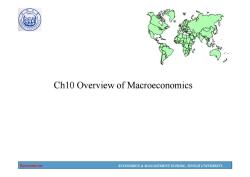
A90 Ch10 Overview of Macroeconomics Economics ECONOMICS MANAGEMENT SCHOOL,TONGJI UNIVERSITY
Economics ECONOMICS & MANAGEMENT SCHOOL, TONGJI UNIVERSITY Ch10 Overview of Macroeconomics
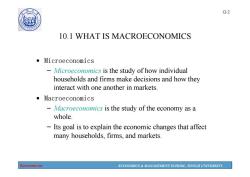
490 12-2 10.1 WHAT IS MACROECONOMICS ●Microeconomics Microeconomics is the study of how individual households and firms make decisions and how they interact with one another in markets. ●Macroeconomics Macroeconomics is the study of the economy as a whole. Its goal is to explain the economic changes that affect many households,firms,and markets. Economics ECONOMICS MANAGEMENT SCHOOL,TONGJI UNIVERSITY
Economics ECONOMICS & MANAGEMENT SCHOOL, TONGJI UNIVERSITY 12-2 10.1 WHAT IS MACROECONOMICS • Microeconomics – Microeconomics is the study of how individual households and firms make decisions and how they interact with one another in markets. • Macroeconomics – Macroeconomics is the study of the economy as a whole. – Its goal is to explain the economic changes that affect many households, firms, and markets
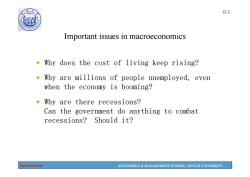
12-3 Important issues in macroeconomics Why does the cost of living keep rising? Why are millions of people unemployed,even when the economy is booming? Why are there recessions? Can the government do anything to combat recessions?Should it? Economics ECONOMICS MANAGEMENT SCHOOL,TONGJI UNIVERSITY
Economics ECONOMICS & MANAGEMENT SCHOOL, TONGJI UNIVERSITY 12-3 Important issues in macroeconomics • Why does the cost of living keep rising? • Why are millions of people unemployed, even when the economy is booming? • Why are there recessions? Can the government do anything to combat recessions? Should it?
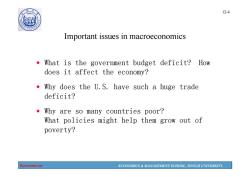
190 12-4 Important issues in macroeconomics What is the government budget deficit?How does it affect the economy? Why does the U.S.have such a huge trade deficit? Why are so many countries poor? What policies might help them grow out of poverty? Economics ECONOMICS MANAGEMENT SCHOOL,TONGJI UNIVERSITY
Economics ECONOMICS & MANAGEMENT SCHOOL, TONGJI UNIVERSITY 12-4 Important issues in macroeconomics • What is the government budget deficit? How does it affect the economy? • Why does the U.S. have such a huge trade deficit? • Why are so many countries poor? What policies might help them grow out of poverty?
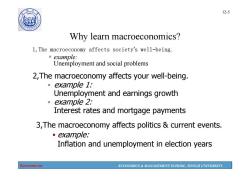
12-5 N Why learn macroeconomics? 1,The macroeconomy affects society's well-being. ■example:. Unemployment and social problems 2,The macroeconomy affects your well-being. example 1: Unemployment and earnings growth example 2: Interest rates and mortgage payments 3,The macroeconomy affects politics current events. example: Inflation and unemployment in election years Economics ECONOMICS MANAGEMENT SCHOOL,TONGJI UNIVERSITY
Economics ECONOMICS & MANAGEMENT SCHOOL, TONGJI UNIVERSITY 12-5 Why learn macroeconomics? 1,The macroeconomy affects society’s well-being. example: Unemployment and social problems 2,The macroeconomy affects your well-being. example 1: Unemployment and earnings growth example 2: Interest rates and mortgage payments 3,The macroeconomy affects politics & current events. example: Inflation and unemployment in election years
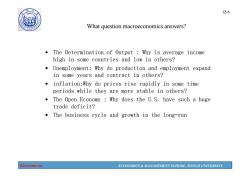
1907 12-6 What question macroeconomics answers? The Determination of Output Why is average income high in some countries and low in others? Unemployment:Why do production and employment expand in some years and contract in others? inflation:Why do prices rise rapidly in some time periods while they are more stable in others? The Open Economy Why does the U.S.have such a huge trade deficit? The business cycle and growth in the long-run Economics ECONOMICS MANAGEMENT SCHOOL,TONGJI UNIVERSITY
Economics ECONOMICS & MANAGEMENT SCHOOL, TONGJI UNIVERSITY 12-6 What question macroeconomics answers? • The Determination of Output : Why is average income high in some countries and low in others? • Unemployment: Why do production and employment expand in some years and contract in others? • inflation:Why do prices rise rapidly in some time periods while they are more stable in others? • The Open Economy : Why does the U.S. have such a huge trade deficit? • The business cycle and growth in the long-run
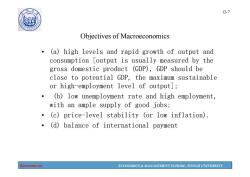
12-7 0 Objectives of Macroeconomics (a)high levels and rapid growth of output and consumption Loutput is usually measured by the gross domestic product (GDP),GDP should be close to potential GDP,the maximum sustainable or high-employment level of output]; (b)low unemployment rate and high employment, with an ample supply of good jobs; (c)price-level stability (or low inflation). .(d)balance of international payment Economics ECONOMICS MANAGEMENT SCHOOL,TONGJI UNIVERSITY
Economics ECONOMICS & MANAGEMENT SCHOOL, TONGJI UNIVERSITY 12-7 Objectives of Macroeconomics • (a) high levels and rapid growth of output and consumption [output is usually measured by the gross domestic product (GDP), GDP should be close to potential GDP, the maximum sustainable or high-employment level of output]; • (b) low unemployment rate and high employment, with an ample supply of good jobs; • (c) price-level stability (or low inflation). • (d) balance of international payment
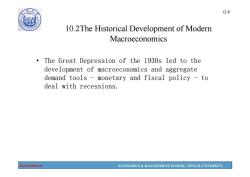
490 12-8 10.2The Historical Development of Modern Macroeconomics The Great Depression of the 1930s led to the development of macroeconomics and aggregate demand tools -monetary and fiscal policy -to deal with recessions. Economics ECONOMICS MANAGEMENT SCHOOL,TONGJI UNIVERSITY
Economics ECONOMICS & MANAGEMENT SCHOOL, TONGJI UNIVERSITY 12-8 10.2The Historical Development of Modern Macroeconomics • The Great Depression of the 1930s led to the development of macroeconomics and aggregate demand tools - monetary and fiscal policy - to deal with recessions
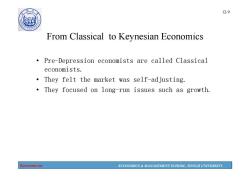
12-9 From Classical to Keynesian Economics Pre-Depression economists are called Classical economists. They felt the market was self-adjusting. They focused on long-run issues such as growth. Economics ECONOMICS MANAGEMENT SCHOOL,TONGJI UNIVERSITY
Economics ECONOMICS & MANAGEMENT SCHOOL, TONGJI UNIVERSITY 12-9 From Classical to Keynesian Economics • Pre-Depression economists are called Classical economists. • They felt the market was self-adjusting. • They focused on long-run issues such as growth
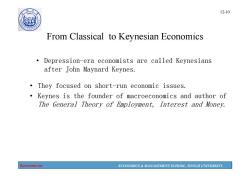
12-10 10 From Classical to Keynesian Economics Depression-era economists are called Keynesians after John Maynard Keynes. They focused on short-run economic issues. Keynes is the founder of macroeconomics and author of The General Theory of Employment,Interest and Money. Economics ECONOMICS MANAGEMENT SCHOOL,TONGJI UNIVERSITY
Economics ECONOMICS & MANAGEMENT SCHOOL, TONGJI UNIVERSITY 12-10 From Classical to Keynesian Economics • Depression-era economists are called Keynesians after John Maynard Keynes. • They focused on short-run economic issues. • Keynes is the founder of macroeconomics and author of The General Theory of Employment, Interest and Money
按次数下载不扣除下载券;
注册用户24小时内重复下载只扣除一次;
顺序:VIP每日次数-->可用次数-->下载券;
- 同济大学:《经济学》课程教学资源(教案讲义)Ch08 Market For Factors of Production.pdf
- 同济大学:《经济学》课程教学资源(教案讲义)Ch07 General Equilibrium and Economic Efficiency.pdf
- 同济大学:《经济学》课程教学资源(教案讲义)Ch06-2 Imperfect Competition.pdf
- 同济大学:《经济学》课程教学资源(教案讲义)Ch06-1 Analysis of Perfectly Competitive Markets.pdf
- 同济大学:《经济学》课程教学资源(教案讲义)Ch05 Analysis of Cost.pdf
- 同济大学:《经济学》课程教学资源(教案讲义)Ch04 Producer Behavior.pdf
- 同济大学:《经济学》课程教学资源(教案讲义)Ch03 Demand and Consumer Behavior.pdf
- 同济大学:《经济学》课程教学资源(教案讲义)Ch02-2 Applications of Supply and Demand.pdf
- 同济大学:《经济学》课程教学资源(教案讲义)Ch02-1 Supply and Demand.pdf
- 同济大学:《经济学》课程教学资源(教案讲义)Ch01 The Fundamentals of Economics(负责人:李永).pdf
- 同济大学:《经济学》课程教学资源(试卷习题)期终考试试卷(B卷)答案.pdf
- 同济大学:《经济学》课程教学资源(试卷习题)期终考试试卷(B卷)试题.pdf
- 同济大学:《经济学》课程教学资源(试卷习题)期终考试试卷(A卷)答案.pdf
- 同济大学:《经济学》课程教学资源(试卷习题)期终考试试卷(A卷)试题.pdf
- 安徽科技学院:《会计信息系统》课程教学资源(PPT课件)第七章 ERP应用概述.ppt
- 安徽科技学院:《会计信息系统》课程教学资源(PPT课件)第六章 会计信息系统审计.ppt
- 安徽科技学院:《会计信息系统》课程教学资源(PPT课件)第五章 会计信息系统的建设与管理.ppt
- 安徽科技学院:《会计信息系统》课程教学资源(PPT课件)第四章 其他业务核算子系统.ppt
- 安徽科技学院:《会计信息系统》课程教学资源(PPT课件)第三章 报表子系统.ppt
- 安徽科技学院:《会计信息系统》课程教学资源(PPT课件)第二章 账务处理子系统.ppt
- 同济大学:《经济学》课程教学资源(教案讲义)Ch09 Externalities and Public Goods.pdf
- 同济大学:《经济学》课程教学资源(教案讲义)Ch11 National Income Accounting.pdf
- 同济大学:《经济学》课程教学资源(教案讲义)Ch12-1 Consumption and Investment.pdf
- 同济大学:《经济学》课程教学资源(教案讲义)Ch12-2 The Determination of Equilibrium Output.pdf
- 同济大学:《经济学》课程教学资源(教案讲义)Ch13 Money Market Equilibrium.pdf
- 同济大学:《经济学》课程教学资源(教案讲义)Ch14 Outputs and Money Market - IS-LM Model.pdf
- 同济大学:《经济学》课程教学资源(教案讲义)Ch15 Aggregate Demand And Supply.pdf
- 同济大学:《经济学》课程教学资源(教案讲义)Ch16 Economic Growth.pdf
- 吉林大学:《中央银行业务管理》课程教学资源(PPT课件)第一章 中央银行制度的形成和发展.ppt
- 吉林大学:《中央银行业务管理》课程教学资源(PPT课件)第七章 中央银行的其他业务.ppt
- 吉林大学:《中央银行业务管理》课程教学资源(PPT课件)第三章 中央银行业务活动的法规原则与资产负债表.ppt
- 吉林大学:《中央银行业务管理》课程教学资源(PPT课件)第九章 中央银行货币政策的目标与工具.ppt
- 吉林大学:《中央银行业务管理》课程教学资源(PPT课件)第二章 中央银行在现代经济体系中的地位与作用.ppt
- 吉林大学:《中央银行业务管理》课程教学资源(PPT课件)第五章 中央银行的资产业务.ppt
- 吉林大学:《中央银行业务管理》课程教学资源(PPT课件)第八章 中央银行货币政策概述.ppt
- 吉林大学:《中央银行业务管理》课程教学资源(PPT课件)第六章 中央银行的支付清算业务.ppt
- 吉林大学:《中央银行业务管理》课程教学资源(PPT课件)第十一章 中央银行的金融监管.ppt
- 吉林大学:《中央银行业务管理》课程教学资源(PPT课件)第十二章 中央银行与外汇管理.ppt
- 吉林大学:《中央银行业务管理》课程教学资源(PPT课件)第十章 货币政策的作用机制.ppt
- 吉林大学:《中央银行业务管理》课程教学资源(PPT课件)第四章 中央银行的负债业务.ppt
